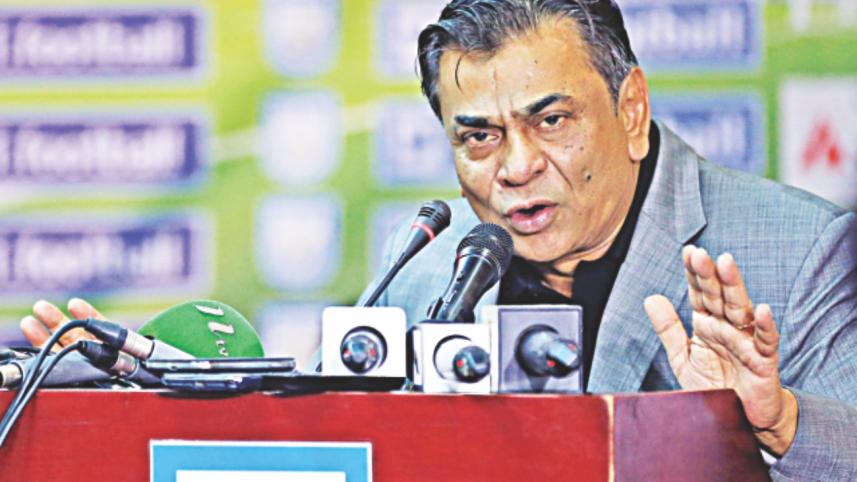Not the renaissance man we believed

When Kazi Salauddin saddled on the BFF (Bangladesh Football Federation) presidency eight years ago, it created a positive vibe. People closely associated with football started to think that the game, which was living on saline at that time, was in good hands at last. There was one extremely loyal Salahuddin follower who took me by surprise. He was Al Musabbir Sadi, my professional colleague at the sports section.
One afternoon in 2009, Sadi came to me and said: “Dosto (friend), my idol is calling and I have decided to join him to pursue my dream.” Sadi was very passionate while talking and I could only wonder about his belief that if football in Bangladesh really needed a charismatic character to revive its old glory, then Salahuddin was next to none.
Sadi left The Daily Star soon and joined his idol to serve the country's football. Unfortunately, Sadi left us all at a young age with an unfulfilled dream, leaving his idol to skate through rough weather. He was one of so many football lovers who had the faith that Salahuddin would pull Bangladesh football out of the gutter. There were logical reasons behind the faith. Salahuddin is not only one of the finest footballers the country has ever produced; he is Bangladesh's first player to have played in a professional league abroad. His football knowledge is precise; he is someone who loves the Dutch style of football; he is a dreamer who believes nothing is impossible. When he speaks, he captivates the audience.
But after eight years on the hot seat of Bangladesh football, Salahuddin's charisma, world of knowledge, big dreams and captivating ability is under serious scrutiny as he prepares for a third and final term for BFF presidency.
Once considered an unparalleled leader, Salahuddin is now feeling the heat of a negative campaign which has often been associated with elections of sports federations. The hate campaign this time has been so nasty that it even questioned his handling of BFF funds and that too from a section which once rallied behind him.
With the judgment day of April 30 drawing nearer, Salahuddin is faced with a kind of adversity he has never experienced before during his decorated career as a footballer, a coach and an administrator.
How good is he as an administrator? What positive changes has he made as BFF boss over the last eight years? Salahuddin will tell you of a lot of positives during his two terms. He will tell you he has fulfilled his commitment of keeping football on the ground round the year. He has arranged more games for the national team despite all those disappointing defeats. True, Bangladesh players got more exposure in international football during his time and their failure on the field has nothing to do with his administrative efforts.
But then ask him whether the whole effort was flawed as he could not produce 'one football-literate' player in his eight years. Whatever answer Salahuddin may come up with, the reality is that we have 30-odd national players but sadly not a single one knows how to play the beautiful game.
Eight years is a long time to build a fresh set of footballers. It is all about continuity, and like Salahuddin, who has dreamt big but painfully lacked the necessary tenacity to pursue that dream, Bangladesh football desperately missed that continuity. We have had an under-16 team which never graduated into an under-21 side, which necessarily takes five years to complete the cycle. The BFF ran top-tier domestic football league every year and to some extent the Pioneer League, which is the beginners' league. But the Third Division, Second Division and The First Division were in absolute chaos. Over the years District Football Leagues fed most of the players in the glamorous Dhaka Leagues. But the introduction of the DFA (District Football Association) in fact almost destroyed the age-old system. This is what Salahuddin, despite being a far-sighted administrator, has failed to address. The BFF Academy is a long story of an unfulfilled adventure and now awaits a complex procedure to become perhaps the only institute in world football which is 'a property of national federation run by a private company'. Eventually all these things had a cumulative negative effect on Bangladesh's football.
It may be too harsh to squarely blame the BFF boss alone for not fulfilling his dream. Actually, Bangladesh football had never been in the hands of a renaissance man in good times or in desperate times. It has always been about running the affairs in a conventional fashion. The only difference is that a lot of people served football out of sheer love in the past, which has subsided dramatically now.
We are not sure if we can find a renaissance man with a pragmatic goal and a whole-hearted effort to fulfil it in near future.



 For all latest news, follow The Daily Star's Google News channel.
For all latest news, follow The Daily Star's Google News channel.
Comments